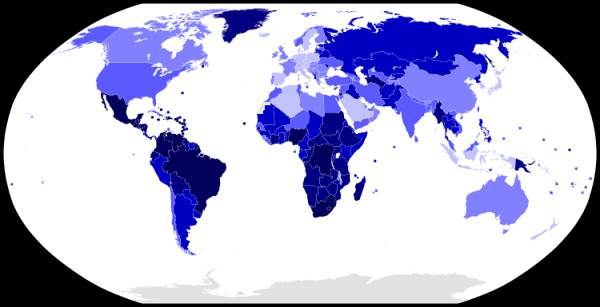
|
17A036 Murder by Country by Jim Davies, 10/17/2017
There's an interesting Wiki page here about murder rates across the world, to which I referred in the aftermath of the Vegas massacre. Anti-gun nuts are of course still insisting - without a shred of logic - that more laws are needed to prevent or limit such outrages, and one of their basic errors is to isolate killings by gun from other kinds of homicide. In the UK for example it's very hard to get a gun; I recall that in about 1946 the government called for all "service" weapons to be surrendered. My father had been a WW2 Army officer and had a revolver, but he turned it in. So if a Brit has murder on his mind, some other weapon must be used, and currently the one most favored seems to be the automobile. You just drive to where there is a crowded sidewalk, flick a finger on the steering wheel, and plow in to the crowd. Presto! Bodies, by your action. And with a little bit of luck, you might even walk away, to kill again another day. Even so, as the Wiki table shows, homicides are five times fewer in that country than in the USA, and that statistic begs for the question to be asked: Why? Why do some societies have a lot fewer murders than others? Given some kind of an answer to that, we may be helped to predict how few there will be in the coming zero government society.
The differences are really startling. US killers end the lives of 4.88 per 100,000 per year, but in the US Virgin Islands, where presumably US standards prevail, the rate is an eye-boggling 52.64! In Puerto Rico, which is maybe kind-of part of the US, the rate is 15.86, or more than 3 times that on the mainland. In the possession of Guam, in contrast, at 2.49 it's only half. The UK rate is a low 0.92 (despite ample car ownership) but some of the countries whose legal system was strongly influenced by Britain during its Empire days, are much higher: Anguilla (27.66), Cayman Islands (14.74) Montserrat (20.39) and even Bermuda at 6.45. Its former colonies in Africa are more populous and very high: Kenya (5.75), Uganda (11.84), Zimbabwe (6.74) and South Africa at 34.27. Conclusion so far: legal systems don't carry much influence. Religion and culture, on the other hand, do. Check that map again: very many of the light-blue areas are mostly Protestant or (!) Muslim, while the darkest blue ones are Roman Catholic (Europe excepted) or animist. So we might say that settled cultural and religious norms keep down the killing. The US is a young country, by the standards of Europe and China, and so while Protestant and fairly light blue, its rate still exceeds that of the Old Countries. Seems to me that when a society has lasted a long time and shared common values, its people tend to put up with, rather than to kill each other. African society has been deeply disrupted during the last couple of centuries by colonization and its aftermath, which propelled violent thugs into governments over regions that never used to be single societies; tribal identities have been torn apart. The same is true to a degree in South America, and the disruption of Russia is well enough known even though it's retained a common religion. The US was populated by numerous incoming cultures from Sweden to Sicily and Portugal to Poland, and later from China and Japan. Remarkably, it's settled down quite well, with a murder rate of only 4.88. Canada and Australia were populated mainly by Brits, so have comparable rates of 1.68 and 0.98 per 100K. Race, too, may play a part. Within the 4.88 rate for the US, blacks (13% of the population) account for more than half of the homicides; or as Wiki puts it here, "the [homicide] rate for African Americans was almost 8 times higher than whites, and the victim rate 6 times higher." But again, it's black society in America that has been most heavily disrupted and impoverished. So what can we anticipate after government has evaporated? At first sight, since the change will embody the greatest disruption in human history, from the above we might expect a great deal of mayhem and murder. However, take a second look: the ZGS will only come about as a result of near-universal acceptance of a common, rational ethical standard (namely, that every person is his or her own self-owner.) That will be the "cultural norm" of the new society, and it will take effect from Day One. Accordingly, in my view precedent will be broken and the rate of intentional homicide will drop like a rock. |
|
||||||||||||||||||||||||||||||||||||||||||

 On the map, the darker the blue the higher the homicide rate, and while Greenland is an obvious statistical anomaly, most of Europe and North America have rather light rates while nearly all of Africa and South and Central America are serious killing zones. How so?
On the map, the darker the blue the higher the homicide rate, and while Greenland is an obvious statistical anomaly, most of Europe and North America have rather light rates while nearly all of Africa and South and Central America are serious killing zones. How so?








